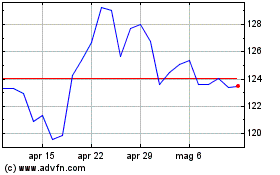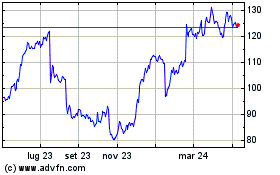New Late-Fee Limits Could Cost Card Issuers $3 Billion
21 Agosto 2010 - 12:05AM
Dow Jones News
Starting Sunday, credit-card issuers could lose over $3 billion
in revenue annually, as new federal laws on late-payment fees kick
in.
The rule, which on average cuts late fees to $25, could fuel
higher minimum payments required on plastic as companies deploy new
tactics to claw back some of the lost revenue. The estimated
decline in revenue comes from CardHub.com, a credit-card comparison
website.
The new rules "restrict the ability of card issuers to impose
late fees," said Rick Fischer, a partner at law firm Morrison &
Foerster.
Odysseas Papadimitriou, chief executive of CardHub.com,
estimates that in 2008, before the new regulations, issuers
collected around $11.4 billion in late fees. He expects this
revenue to drop 29% to around $8.1 billion, as the new rules
governing late payments on card balances go into effect.
Calculating the financial impact is difficult because few card
companies disclose how much revenue is derived from imposing fees
and other penalties on customers who fall behind on their
bills.
The new rule states that from Aug. 22, late payers will be
charged $25 or the minimum payment due by the cardholder, whichever
is lower, eliminating the typical $39 fee that card companies
currently levy. Card issuers are allowed to charge $35 in late fees
to repeat offenders within a six-month period.
The rule is one plank of a raft of new regulations, dubbed the
Credit Card Accountability Responsibility and Disclosure Act of
2009. These new regulations are expected to cost the card industry
about $11 billion a year in lost revenue for five years, according
to Robert Hammer, who runs R.K. Hammer, a credit-card consulting
firm.
Discover Financial Services (DFS) Chief Executive David Nelms
said in June rules curbing late payment fees will have an $80
million to $90 million impact on the company's income before taxes
over a 12-month period. Bank of America Corp. (BAC) said last month
the card issuer would take a roughly $1 billion hit, after taxes,
on what it earns from interest and fees in 2010 because of the new
regulations.
The laws have made some important changes. Starting Sunday, card
companies will also be required to review every six months accounts
whose interest rates have been increased. The average advertised
interest rate for credit cards in the U.S. has risen to 13.7% from
11.64% in May 2009, before the legislation was passed, according to
Bill Hardekopf, chief executive of LowCards.com, a Web site that
tracks the industry.
To make up for some of the lost revenue from this and prior
regulatory changes, some card issuers have already employed new
tactics: higher fees on balance transfers and cash advances,
increased charges for overseas transactions and new or higher
annual fees on cards. Another tactic they could deploy on the heels
of the new rules around late fees: raising the bar on the monthly
minimum payments due on credit-card balances. Up until now, these
minimum payments have ranged from $10-to-$15, according to Pew
Charitable Trusts, a nonprofit group.
"I think it's possible we'll see banks raise their minimum
payment levels closer to $25 or $35," to match the new late fee
limits, says Nick Bourke, director of the Safe Credit Card Project
at Pew.
A Discover spokesman said minimum payments for some cardholders,
especially those transferring balances from other credit-cards,
have risen since last year as the company switched to variable from
fixed interest rates for its card balances. Earlier this year,
Discover increased its cash advance fee from 3% with a $5 fee
minimum to 5% with a $10 fee minimum.
American Express Co. (AXP), known for its affluent borrowers and
generous rewards, is raising the annual fee on its co-branded
Starwood Hotels cards to $65 from $45, starting October. Capital
One Financial Corp. (COF) hasn't changed its minimum payment
requirements since Jan. 2009, said a spokeswoman. It increased cash
advance fees to 24.9% from 22.9% last year. Bank of America also
hasn't changed its minimum payment requirements. It is testing an
annual fee ranging from $29 to $99 on less than 1% of its
cardholders. A JP Morgan Chase & Co. (JPM) spokeswoman said its
minimum payment calculations haven't changed in over a year. The
lender raised its maximum balance transfer fee to 5% from 2% in
2009. A Citigroup Inc. (C) spokesman was unavailable for
comment.
-By Aparajita Saha-Bubna, Dow Jones Newswires; 617-654-6729;
aparajita.saha-bubna@dowjones.com
Grafico Azioni Discover Financial Servi... (NYSE:DFS)
Storico
Da Giu 2024 a Lug 2024

Grafico Azioni Discover Financial Servi... (NYSE:DFS)
Storico
Da Lug 2023 a Lug 2024
